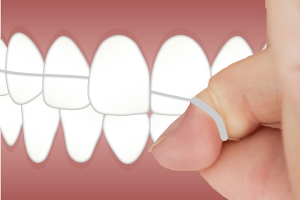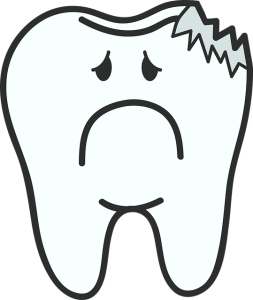Is flossing important?
Flossing is an essential part of maintaining good oral hygiene. In the UK, it often gets left out as superficial: why floss when you already brush? However, brushing isn’t magic. The same reasons you should brush your teeth are why dental floss is important. Dental floss just targets a different part of the mouth.
Plaque and Bacteria Are In-Between Your Teeth
 Brushing alone cannot effectively reach between your teeth and along the gumline. Even interdental brushes are not as narrow as the gaps between some teeth. However, bacteria and plaque are so small they can hide in the space where teeth touch, as well as along the gumline. Flossing your teeth removes plaque, bacteria, and food particles from these hard-to-reach areas
Brushing alone cannot effectively reach between your teeth and along the gumline. Even interdental brushes are not as narrow as the gaps between some teeth. However, bacteria and plaque are so small they can hide in the space where teeth touch, as well as along the gumline. Flossing your teeth removes plaque, bacteria, and food particles from these hard-to-reach areas
Removing Plaque Helps Prevent Tooth Decay and Gum Disease
Wherever plaque and bacteria grow, even if it’s just between your teeth, they impact your dental health.
Tooth Decay
 Because plaque lives on the sugars in your food, it is constantly digesting what is left on your teeth. This leaves an acidic substance on your tooth, which dissolves the enamel and causes cavities.
Because plaque lives on the sugars in your food, it is constantly digesting what is left on your teeth. This leaves an acidic substance on your tooth, which dissolves the enamel and causes cavities.
If plaque bacteria are left between the teeth, they multiply and cover the rest of your tooth surface before you brush again. This happens more quickly than it would if you had flossed simply because there is more plaque left behind: they get a head start.
The best way to prevent tooth decay is to remove as much plaque from your mouth as possible so that levels stay low throughout the day.
Gum Disease
Conditions such as gingivitis and periodontitis develop when plaque and bacteria accumulate along the gumline, as they irritate the gums, causing inflammation. Flossing daily helps remove this buildup from areas the brush can’t reach.
Several studies have linked gum disease to various systemic health conditions such as heart disease, diabetes, respiratory infections, and premature labour. Because the body is an interconnected system, it is important to look after every part through good habits.
Letting gum disease go untreated is a risk to your overall health. Prevent it by flossing daily.
Flossing Also Prevents Bad Breath
Food particles trapped between teeth can contribute to bad breath (halitosis). By flossing, you can remove the trapped debris, reducing odour-causing bacteria and improving breath freshness.
How to Floss Properly
 It’s best to floss before brushing so that anything you dislodge with the floss gets properly removed afterwards.
It’s best to floss before brushing so that anything you dislodge with the floss gets properly removed afterwards.
- Break off a 3-4 inch piece of dental floss.
- Wrap the ends around your index fingers, leaving a gap in between
- Starting at one side of the mouth, loop the floss between your teeth
- Pull back and forth, moving the floss up and down while applying gentle pressure to the surface of the teeth.
- Remove the floss and repeat all around your mouth, top and bottom.
If you have any concerns or questions, asking your dentist is the best course of action.

